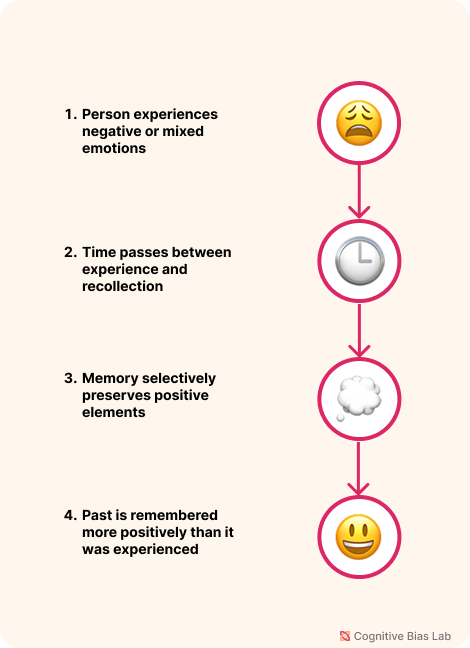Rosy Retrospection
Your progress on this bias test won't be saved after you close your browser.
Understanding Rosy Retrospection
Rosy Retrospection
Our minds paint the past with a deceptively positive brush, minimizing struggles and amplifying joys. This selective memory affects how we evaluate current situations and make future plans.
Overview
Rosy retrospection is our tendency to remember past events more positively than they actually were, selectively enhancing the good while filtering out the difficult or unpleasant aspects. This creates a mental highlight reel that can significantly impact decision-making.
Key Points:
- The brain systematically enhances positive memories while downplaying negative elements
- This bias creates a distorted baseline for comparing current experiences
- The greater the time elapsed, the stronger the effect can become
- It affects both personal and professional decision-making contexts
Impact: Rosy retrospection can lead to problematic patterns in business and personal life. Project managers might underestimate timelines and budgets because they recall previous projects as smoother than documented evidence suggests. Teams may repeatedly encounter the same obstacles because they've mentally minimized those challenges in past iterations.
Practical Importance: Recognizing this bias is crucial for strategic planning and performance evaluation. By developing systems that capture both qualitative experiences and quantitative outcomes at the time they occur, professionals can create more accurate references for future decision-making and avoid repeating overlooked mistakes.

Visual representation of Rosy Retrospection (click to enlarge)
Examples of Rosy Retrospection
Here are some real-world examples that demonstrate how this bias affects our thinking:
Psychological Study Simulation
Rosy Retrospection
Experience how our memories of past events can become more positive over time.
In this simulation, you'll experience how our memories of past events can become more positive over time, even if the actual experience wasn't as enjoyable as we remember it.
You'll go through a simulated 3-day vacation, rating your experience in real-time and then recalling it later. This will help demonstrate the rosy retrospection effect.
The Idealized Project Timeline
A development team launches a complex software project with a 12-month timeline based on their recollection of a similar previous project. Despite documented evidence showing their last project actually took 18 months and encountered significant technical hurdles, the team's memory has filtered out these challenges. The current project similarly runs over budget and schedule because their planning was based on an unrealistically positive memory rather than factual records.
The Conference Nostalgia Effect
A marketing director argues for allocating $50,000 to a particular industry conference, citing how tremendously valuable previous attendance was. When pressed for specific ROI metrics, she can't provide any, as her positive emotional memory has overshadowed the limited tangible outcomes. A colleague who reviews past expense reports and lead generation data discovers the conference historically produced minimal business results despite the team's fond recollections of productive networking.
How to Overcome Rosy Retrospection
Here are strategies to help you recognize and overcome this bias:
Real-Time Documentation
Maintain structured logs throughout a project that capture both achievements and setbacks as they occur. This creates a factual record that offsets idealized memories during future reflection.
Metric-Based Retrospectives
Begin project reviews with objective data such as timelines, budgets, and KPIs. Reviewing facts before discussing personal impressions helps prevent memory from shaping an inaccurately positive narrative.
Test Your Understanding
Challenge yourself with these questions to see how well you understand this cognitive bias:
A team leader consistently estimates new projects will take 4 weeks based on his memory of similar past work. Documentation shows previous projects actually took 7-8 weeks. What's occurring?
Academic References
- Mitchell, T. R., Thompson, L., Peterson, E., & Cronk, R. (1997). Temporal Adjustments in the Evaluation of Events: The 'Rosy View'. Journal of Experimental Social Psychology, 33(4), 421-448.
- Schacter, D. L. (1999). The seven sins of memory: Insights from psychology and cognitive neuroscience. American Psychologist, 54(3), 182–203.